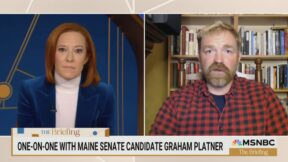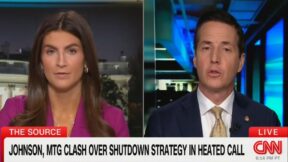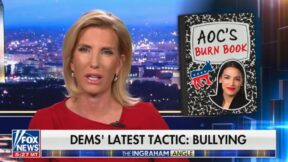Blistering Anti-Trump Filing Lays Out ‘Terrifying’ Scenarios If Trump Wins Supreme Court Immunity Appeal

AP Photo/Manuel Balce Ceneta
A new filing opposing former President Donald Trump’s Supreme Court appeal demanding absolute immunity lays out “terrifying” scenarios if Trump were to win that appeal.
Five weeks ago, at a stunning appeals court hearing, Trump’s attorney argued that a president could order SEAL Team Six to assassinate a political rival and not face prosecution unless he were impeached and convicted first.
The DC Circuit Court of Appeals struck down Trump’s appeal in a 57-page opinion last Tuesday. The blistering ruling stunned many analysts with its force and clarity. They gave Trump a deadline of Feb. 12 to file a notice of appeal or the DC case would proceed.
On Monday, Trump’s team filed an appeal with the Supreme Court demanding they stay the Jan. 6 trial being presided over by Judge Tanya Chutkan. Special Counsel Jack Smith has until Feb. 20 to file a response.
A group of legal experts led by retired conservative Judge Michael Luttig filed a scathing 20-page amicus brief Tuesday that systematically identified errors and falsehoods in the Trump filing, and laid out the “terrifying” possibilities if Trump succeeds.
While none were quite as vivid as the assassination hypothetical, they were indeed highly disturbing. A sampling:
The scope of criminal immunity proposed by former President Trump would turn Nixon v. Fitzgerald on its head by encouraging the greatest possible threat of “intrusion on the authority and functions of the Executive Branch,” id. at 754 — a losing President’s efforts to usurp the authority and functions of a duly-elected successor President.
…
(T)he former President argues that he was acting officially when he allegedly conspired to commit federal criminal conduct by using Department of Justice personnel to make false statements to state officials to support his efforts to overturn declared state election results. Indictment, ¶¶ 70, 75, 78-79, 84. If that qualified for absolute immunity, the precedent would improperly encourage a future President to violate federal criminal statutes by deploying the military and armed federal agents in efforts to alter the results of a presidential election.
…
(I)t would turn Article II on its head if absolute immunity were so broad that it encouraged a President to violate federal criminal statutes by seeking to corrupt, deceive, or intimidate the officials to whom, unlike the President, Article II assigns duties concerning presidential election results.
…
A future President could disregard these criminal statutes and deploy the military and armed federal agents to prevent the counting of votes in an unfavorable county or of a certain type (such as mail-in ballots) by seizing ballots and voting machines. Such absolute immunity also would encourage that President to use the military and armed federal agents to bar physically his or her opponent’s electors from casting their electoral votes on the day and in the place required by 3 U.S.C. § 7 and state law.
And absolute immunity from federal criminal liability under 18 U.S.C. §§ 1509, 401(3), and 2(a) and (b) would embolden a President to command the military and armed federal agents to defy court orders to desist. Indeed, before the D.C. Circuit’s decision in this case, a Senate ally of Mr. Trump approvingly stated that a future President Trump could defy a Supreme Court ruling that related to the military.
Luttig et al. go on to write, “These terrifying possibilities are real, not remote. Indeed, after this Court refused to overturn the 2020 election results in Texas v. Pennsylvania, 141 S. Ct. 1230 (2020), there was a drumbeat of calls from allies of President Trump for him to deploy the military.”
The filing then lists chapter-and-verse examples of other Trump and Trump ally actions that correspond to the scenarios they raise.
The Supreme Court could decide to hear the case on an expedited basis, grant Trump’s demand to take it up under the normal course of business, or deny cert and affirm the appeals court ruling.




